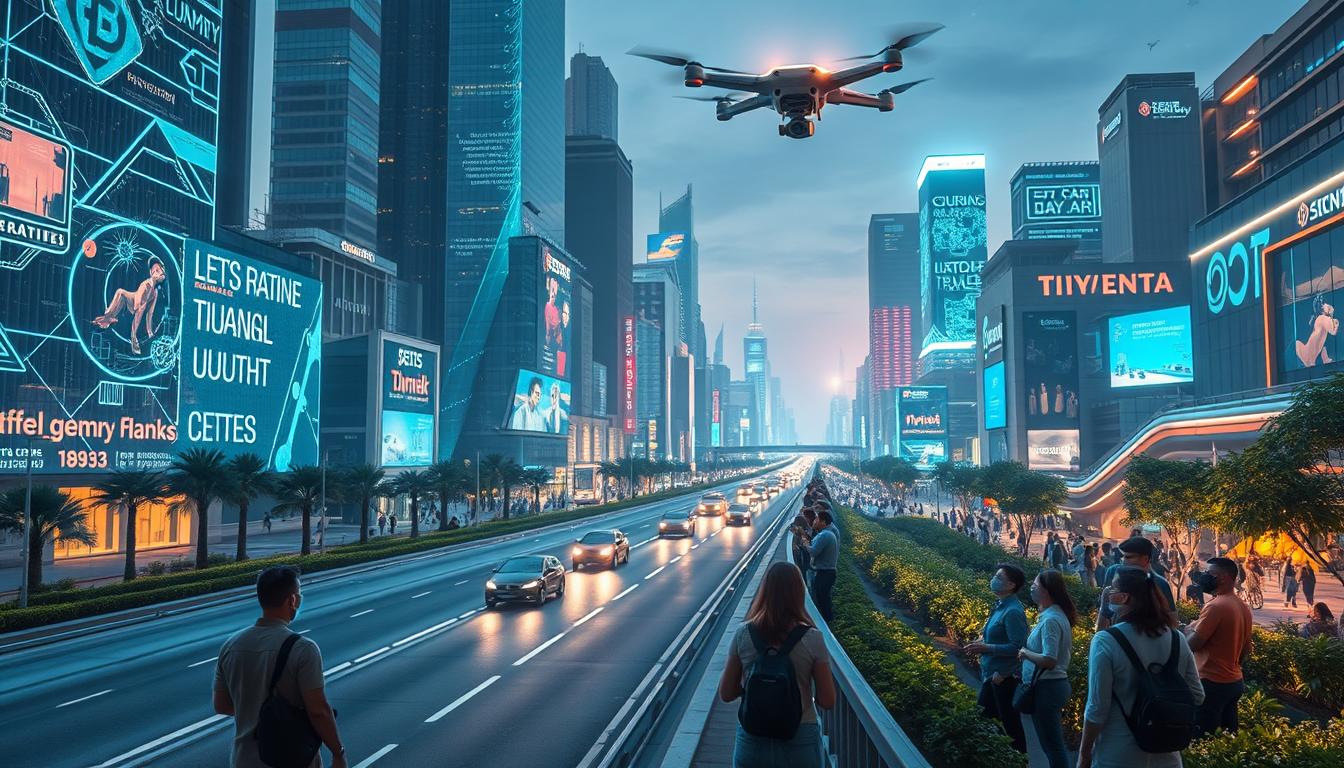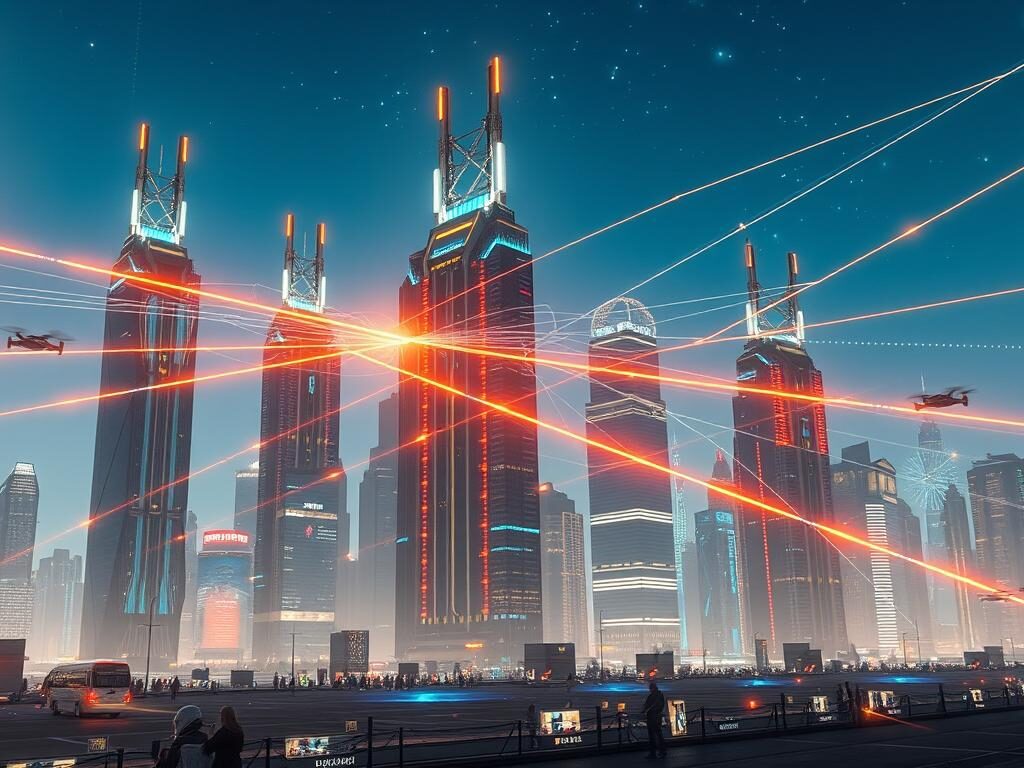
Top Technology Trends : The Future of Tech
Did you know the global AI market is expected to hit $1.3 trillion by 2025? This shows how fast top tech trends are changing things. As someone who loves watching the digital world, I’m excited to share these new ideas. They’re making big changes in how we work and live.
In this article, we’ll look at the latest in AI and machine learning. We’ll also talk about big data, cloud computing, and cybersecurity. Plus, we’ll explore the Internet of Things, 5G networks, and blockchain technology. Knowing about these trends helps us get ready for the future and use these technologies to make our lives better.
Key Takeaways
- The global artificial intelligence (AI) market is projected to reach $1.3 trillion by 2025, showcasing the transformative power of emerging technologies.
- Artificial intelligence and machine learning are enabling new levels of automation and decision-making, with applications in healthcare, finance, and beyond.
- The explosion of big data is driving the need for advanced analytics and cloud computing to store, process, and extract insights from massive datasets.
- Cybersecurity is a critical concern as the digital world continues to expand, requiring robust measures to protect against cyber threats.
- The Internet of Things (IoT) is connecting everything, from smart homes and cities to industrial supply chains, revolutionizing how we live and work.
- 5G networks are ushering in a new era of faster, more reliable connectivity, enabling emerging technologies like autonomous vehicles and virtual reality.
- Blockchain technology is disrupting industries by providing secure, decentralized platforms for transactions, data sharing, and more.
Embracing Artificial Intelligence and Machine Learning
Artificial intelligence (AI) and machine learning (ML) are leading the way in technology. They are changing industries and how we solve problems. These technologies are getting better and being used in more ways.
AI-Powered Automation and Decision Making
AI is big in automation. It makes business processes smoother, handles repetitive tasks, and helps make better decisions. This means companies can work more efficiently, cut down on mistakes, and make smarter choices.
Machine Learning in Healthcare and Finance
In healthcare, ML helps doctors make more accurate diagnoses and tailor treatments. It looks at lots of medical data to find patterns and problems early. This leads to better care and outcomes.
In finance, ML changes how data is analyzed and investment decisions are made. It finds trends and patterns in financial data. This helps in making better investment plans and managing risks.
| Industry | AI and ML Applications | Benefits |
|---|---|---|
| Healthcare |
|
|
| Finance |
|
|
“Artificial intelligence and machine learning are not just the future – they are shaping the present, transforming industries and improving lives in tangible ways.”
As we keep using AI and ML, the future looks bright. These technologies open up new possibilities and help us work better. They improve our lives and shape the future in many ways.
Unleashing the Power of Big Data
The growth of data has changed how businesses make decisions. Big data helps us analyze large data sets. This tool is key for making better, data-driven decisions.
In many fields, like marketing and research, big data changes how we solve problems. It helps us plan better.
Big data lets us find patterns and trends we wouldn’t see otherwise. It helps businesses understand their customers better. This knowledge helps them make better decisions, like improving marketing or creating new products.
Using big data with advanced tools like machine learning boosts its power. These tools help process data fast. This way, businesses can make quick, smart decisions that lead to innovation.
“The ability to take data—to be able to understand it, to process it, to extract value from it, to visualize it, to communicate it—that’s going to be a hugely important skill in the next decades.”
As data grows, using big data becomes more crucial. By using data analytics, businesses can grow, work better, and stay competitive. This is key in today’s fast-changing world.
Cloud Computing: The New Frontier
The world of technology has changed a lot, thanks to cloud computing. It has become a key player in our digital world. Cloud computing is opening up new possibilities for both businesses and individuals.
Scalability and Cost Efficiency
Cloud computing offers unmatched scalability. Businesses can adjust their computing needs easily without the need for expensive hardware. This scalability makes operations flexible and saves money, as you only pay for what you use.
Cloud-Based Collaboration and Productivity
Cloud-based tools have changed how we work together and get things done. Collaboration is now easy, with teams working on projects together in real-time. Productivity has also improved, thanks to the ability to work from anywhere on any device.
| Feature | Benefits |
|---|---|
| Scalability | Easily scale computing resources up or down as needed |
| Cost Efficiency | Pay only for the resources used, reducing IT infrastructure costs |
| Collaboration | Seamless real-time collaboration on shared documents and projects |
| Productivity | Increased flexibility and mobility to work from anywhere, on any device |
As we move forward, cloud computing is becoming more important. It’s helping businesses and individuals to work better and achieve more. The future is indeed bright, powered by the cloud.
Cybersecurity: Protecting the Digital Realm
Our use of digital technology is growing fast. This makes strong cybersecurity very important. The world of cyber threats is changing, and we need good information security to keep our data safe.
Cyber attacks like malware and phishing are getting smarter. This means we all need to be more careful. We should use a mix of network security, access controls, and keep our software up to date.
Using new tech like AI can help fight cyber threats. It lets us find and stop attacks quickly. This keeps our important stuff safe and helps businesses keep running.
It’s also key to teach people about cybersecurity. We need to train everyone to spot and report strange things. Working together, we can all stay safer online.
“The best defense against cyber threats is a well-informed and proactive approach to cybersecurity.”
The need for strong cybersecurity will only get bigger. By using new tech and being careful, we can face the future of cyber threats with confidence.

| Cybersecurity Threats | Potential Impacts |
|---|---|
| Malware Attacks | Data breaches, system disruption, financial losses |
| Phishing Scams | Identity theft, financial fraud, brand reputation damage |
| Ransomware Attacks | Data encryption, service disruption, extortion demands |
| Distributed Denial of Service (DDoS) | Network overload, service unavailability, business interruption |
The Internet of Things: Connecting Everything
The Internet of Things (IoT) has changed how we interact with our world. It’s making our homes and cities smarter. IoT connects many devices and sensors, changing our lives and improving industries.
Smart Homes and Cities
Smart home tech lets homeowners control their homes better. It includes smart climate control and security systems. These devices make our lives easier and more comfortable.
Smart cities use IoT to improve their infrastructure. They also cut down on energy use. This gives citizens better services and data in real-time.
Industrial IoT and Supply Chain Management
The industrial world has also seen the benefits of IoT. Industrial IoT (IIoT) connects machines and data. It makes industries more efficient and productive.
IIoT helps with maintenance, tracking inventory, and improving logistics. This leads to better productivity and cost savings for industries.
| IoT Application | Benefits |
|---|---|
| Smart Home | Automated energy management, enhanced security, and improved convenience |
| Smart City | Efficient resource allocation, reduced environmental impact, and improved public services |
| Industrial IoT | Optimized supply chain operations, predictive maintenance, and increased productivity |
The Internet of Things is growing, and its effects will get bigger. It connects devices and data, bringing smart solutions to our lives and work. This is changing how we live and work in big ways.
5G Networks: The Next Generation of Connectivity
The introduction of 5G networks marks a new chapter in wireless technology. It promises fast internet and low latency. This technology is set to change many industries and bring new innovative technologies and applications.
Faster Speeds and Lower Latency
5G’s main advantage is its speed and low latency. It’s much faster than older wireless tech, with speeds up to 10 times quicker. Latency is also much lower, down to just a millisecond.
This makes it perfect for real-time applications. Think remote healthcare, self-driving cars, and virtual reality. These areas will see huge improvements thanks to 5G.
Enabling New Technologies and Applications
5G’s high-speed and low-latency connectivity opens doors to new tech and apps. It’s great for smart cities, connected homes, and industrial automation. It also powers IoT solutions.
This tech will make data transfer seamless and quick. It will help in making fast decisions and integrating advanced features across sectors. This will usher in a new digital age.
| Key Benefits of 5G Networks | Potential Applications |
|---|---|
|
|
As 5G networks grow, so do the possibilities. It’s changing how we live, work, and interact online. This tech is set to bring about a future filled with innovative technologies.

Blockchain Technology: Revolutionizing Industries
Blockchain technology is changing the digital world. It offers a secure, transparent, and efficient way to manage data and make transactions. This is transforming industries all over the world.
At the core of blockchain is the idea of decentralized systems. Unlike old systems, blockchain spreads data across many nodes. This means no single point controls it. It makes security and transparency better, as every deal is recorded on a shared, unchangeable ledger.
Blockchain also brings smart contracts to life. These digital agreements can automate complex tasks. They make processes smoother and cut down on mistakes. Smart contracts are changing finance, supply chain, and real estate, making transactions quicker and more reliable.
Blockchain is also used for new ideas that challenge old ways of doing things. It’s behind decentralized finance (DeFi) and non-fungible tokens (NFTs). It lets people and businesses control their digital stuff and deals.
“Blockchain technology has the potential to transform entire industries by providing a secure, transparent, and decentralized platform for data management and transactions.”
As more people use blockchain technology, its role in shaping the future is clear. It’s changing finance and improving supply chains. Blockchain’s effect on the digital world is huge.
Conclusion
Looking back at the technology trends in this article, I see how innovation changes everything. Advances in artificial intelligence and machine learning are just the start. Cloud computing, the Internet of Things, and 5G networks are also making big waves. These technologies are reshaping industries worldwide.
They are setting the stage for a future where technology meets our needs in new ways. Artificial intelligence and machine learning are making automation smarter. Big data is giving us insights we never had before. Cloud computing makes things more efficient and collaborative.
But we must also protect our digital world with strong cybersecurity. The Internet of Things is linking our physical and digital lives. And 5G networks are bringing us faster, more reliable connections.
As we move forward, staying alert and open to change is key. Let’s use these technologies to make our world better. By embracing the future, we can create a more connected, efficient, and safe place for everyone.
FAQ
What are the top technology trends that are shaping the future?
The future is being shaped by trends like artificial intelligence and machine learning. Big data and data analytics are also key. Cloud computing, cybersecurity, and the Internet of Things are important too. The rollout of 5G networks and blockchain technology are also significant.
How is artificial intelligence and machine learning transforming industries?
Artificial intelligence and machine learning are changing industries a lot. They bring AI-powered automation and decision-making. In healthcare and finance, ML is improving diagnosis and analysis.
What are the benefits of big data and data analytics?
Big data helps make better decisions by analyzing large data sets. It’s used in many sectors. This way, businesses can get insights, improve efficiency, and make strategic choices.
How is cloud computing revolutionizing the way we access and process information?
Cloud computing changes how we store and access information. It offers scalability and cost savings. Cloud tools make data storage and collaboration easier, changing how we work.
Why is cybersecurity becoming increasingly important in the digital age?
Cybersecurity is crucial as we rely more on digital tech. The threat landscape is changing fast. We need strong security to protect data and infrastructure from breaches.
How is the Internet of Things (IoT) changing the way we interact with our environment?
IoT is changing how we interact with our world. It brings smart homes and cities, and improves supply chain management. IoT makes systems more connected and efficient.
What are the benefits of 5G networks?
5G networks bring fast, low-latency wireless connectivity. They enable new technologies and applications. This includes autonomous vehicles and remote healthcare services.
How is blockchain technology revolutionizing industries?
Blockchain is changing industries by offering a secure, transparent platform. It streamlines processes and enhances security. It also enables smart contracts and new applications.